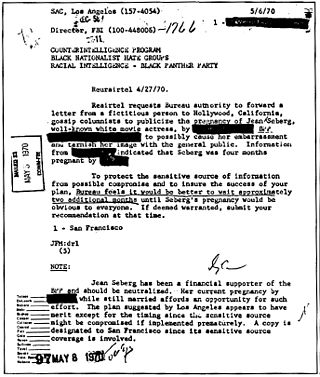
COINTELPRO was a series of covert and illegal projects conducted between 1956 and 1971 by the United States Federal Bureau of Investigation (FBI) aimed at surveilling, infiltrating, discrediting, and disrupting American political organizations that the FBI perceived as subversive. Groups and individuals targeted by the FBI included feminist organizations, the Communist Party USA, anti-Vietnam War organizers, activists in the civil rights and Black power movements, environmentalist and animal rights organizations, the American Indian Movement (AIM), Chicano and Mexican-American groups like the Brown Berets and the United Farm Workers, and independence movements. Although the program primarily focused on organizations that were part of the broader New Left, they also targeted white supremacist groups such as the Ku Klux Klan and the National States' Rights Party.

Mumia Abu-Jamal is an American political activist and journalist who was convicted of murder and sentenced to death in 1982 for the 1981 murder of Philadelphia police officer Daniel Faulkner. While on death row, he has written and commented on the criminal justice system in the United States. After numerous appeals, his death sentence was overturned by a federal court. In 2011, the prosecution agreed to a sentence of life imprisonment without parole. He entered the general prison population early the following year.

Robert George Seale is an American engineer, political activist and author. Seale is widely known for co-founding the Black Panther Party with fellow activist Huey P. Newton. Founded as the "Black Panther Party for Self-Defense", the Party's main practice was monitoring police activities and challenging police brutality in black communities, first in Oakland, California, and later in cities throughout the United States.

David Joel Horowitz is an American conservative writer and activist. He is a founder and president of the David Horowitz Freedom Center (DHFC); editor of the Center's website FrontPage Magazine; and director of Discover the Networks, a website that tracks individuals and groups on the political left. Horowitz also founded the organization Students for Academic Freedom.
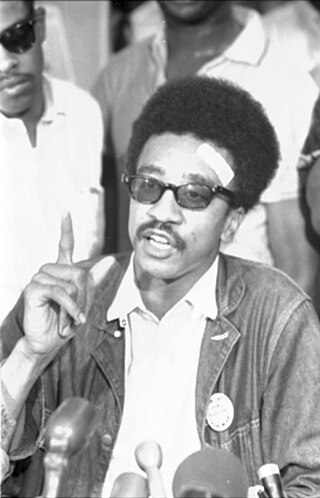
Jamil Abdullah al-Amin, is an American human rights activist, Muslim cleric, and black separatist who was the fifth chairman of the Student Nonviolent Coordinating Committee (SNCC) in the 1960s. Best known as H. Rap Brown, he served as the Black Panther Party's minister of justice during a short-lived alliance between SNCC and the Black Panther Party.

Leroy Eldridge Cleaver was an American writer and political activist who became an early leader of the Black Panther Party.
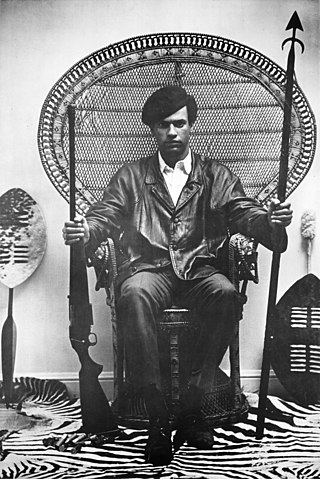
Huey Percy Newton was an African American revolutionary and political activist who founded the Black Panther Party. He ran the party as its first leader and crafted its ten-point manifesto with Bobby Seale in 1966.
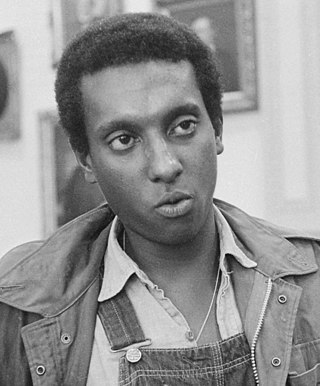
Kwame Ture was an American activist who played a major role in the civil rights movement in the United States and the global pan-African movement. Born in Trinidad in the Caribbean, he grew up in the United States from the age of 11 and became an activist while attending the Bronx High School of Science. He was a key leader in the development of the Black Power movement, first while leading the Student Nonviolent Coordinating Committee (SNCC), then as the "Honorary Prime Minister" of the Black Panther Party, and last as a leader of the All-African People's Revolutionary Party (A-APRP).
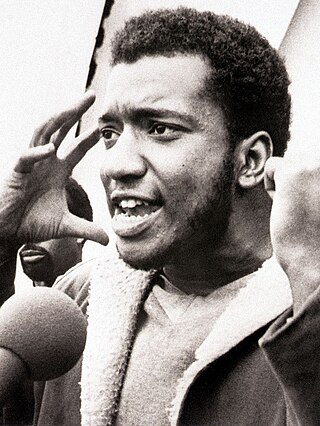
Fredrick Allen Hampton Sr. was an American Marxist-Leninist revolutionary. He came to prominence in his late teens and early 20s in Chicago as deputy chairman of the national Black Panther Party and chair of the Illinois chapter. As a progressive African American, he founded the anti-racist, anti-classist Rainbow Coalition, a prominent multicultural political organization that initially included the Black Panthers, Young Patriots, and the Young Lords, and an alliance among major Chicago street gangs to help them end infighting and work for social change. Hampton considered fascism the greatest threat, saying "nothing is more important than stopping fascism, because fascism will stop us all."

The Black Liberation Army (BLA) was an underground Marxist-Leninist, black-nationalist militant organization that operated in the United States from 1970 to 1981. Composed of former Black Panthers (BPP) and Republic of New Afrika (RNA) members who served above ground before going underground, the organization's program was one of war against the United States government, and its stated goal was to "take up arms for the liberation and self-determination of black people in the United States." The BLA carried out a series of bombings, killings of police officers, robberies, and prison breaks.
Honky is a racial slur used to refer to white people, predominantly heard in the United States.

John Sinclair was an American poet, writer, and political activist from Flint, Michigan. Sinclair's defining style is jazz poetry, and he released most of his works in audio formats. Most of his pieces include musical accompaniment, usually by a varying group of collaborators dubbed Blues Scholars.

Kuwasi Balagoon, born Donald Weems, was an American political activist, anarchist and member of the Black Panther Party and Black Liberation Army. Radicalised by race riots in his home state of Maryland growing up, as well as by his experiences while serving in the US Army, Weems became the black nationalist known as Kuwasi Balagoon in New York City in the late 1960s. First becoming involved in local Afrocentric organisations in Harlem, Balagoon would move on to become involved in the New York chapter of the Black Panther Party, which quickly saw him charged and arrested for criminal behaviour. Balagoon was initially part of the Panther 21 case, in which 21 panthers were accused of planning to bomb several locations in New York City, but although the Panther 21 were later acquitted, Balagoon's case was separated off and he was convicted of a New Jersey bank robbery.

Randall LeRoy Kennedy is an American legal scholar. He is the Michael R. Klein Professor of Law at Harvard University and his research focuses on the intersection of racial conflict and legal institutions in American life. He specializes in contracts, freedom of expression, race relations law, civil rights legislation, and the Supreme Court.

Sekou Odinga was an American New Afrikan activist who was imprisoned for actions with the Black Liberation Army in the 1960s and 1970s.

The Black Panther Party was a Marxist–Leninist and black power political organization founded by college students Bobby Seale and Huey P. Newton in October 1966 in Oakland, California. The party was active in the United States between 1966 and 1982, with chapters in many major American cities, including San Francisco, New York City, Chicago, Los Angeles, Seattle, and Philadelphia. They were also active in many prisons and had international chapters in the United Kingdom and Algeria. Upon its inception, the party's core practice was its open carry patrols ("copwatching") designed to challenge the excessive force and misconduct of the Oakland Police Department. From 1969 onward, the party created social programs, including the Free Breakfast for Children Programs, education programs, and community health clinics. The Black Panther Party advocated for class struggle, claiming to represent the proletarian vanguard.
In African-American history, the post–civil rights era is defined as the time period in the United States since Congressional passage of the Civil Rights Act of 1964, the Voting Rights Act of 1965, and the Fair Housing Act of 1968, major federal legislation that ended legal segregation, gained federal oversight and enforcement of voter registration and electoral practices in states or areas with a history of discriminatory practices, and ended discrimination in the renting and buying of housing.

Donald Lee Cox, known as Field Marshal DC, was an early member of the leadership of the African American revolutionary leftist organization the Black Panther Party, joining the group in 1967. Cox was titled the Field Marshal of the group during the years he actively participated in its leadership, due to his familiarity with and writing about guns.

In the United States, black genocide is a historiographical framework and rhetorical term used to analyze the past and present impact of systemic racism on African Americans by both the United States government and white Americans. The decades of lynchings and long-term racial discrimination were first formally described as genocide by a now-defunct organization, the Civil Rights Congress, in a petition which it submitted to the United Nations in 1951. In the 1960s, Malcolm X accused the US government of engaging in human rights abuses, including genocide, against black people, citing long-term injustice, cruelty, and violence against blacks by whites.

















